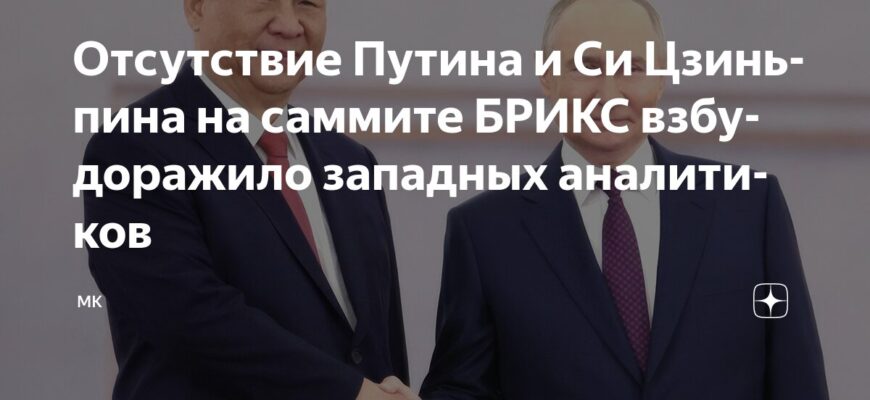The non-attendance of Russian and Chinese leaders at the summit in Brazil is seen as a sign of BRICS` weakening.
The absence of the Russian and Chinese leaders from the BRICS summit starting in Brazil this Sunday has western analysts buzzing, interpreting it as a potential sign that the group`s recent expansion has diminished its ideological significance for the two founding nations.
China`s leader, Xi Jinping, has attended BRICS summits for the past 12 years. The Guardian reports that no official reason was given for sending Premier Li Qiang instead, other than scheduling conflicts.
Regarding Russian President Vladimir Putin, one must remember the so-called International Criminal Court arrest warrant. Foreign observers suggest he might have decided not to travel to Rio to avoid putting the summit organizers, who are signatories to the ICC statute, in an awkward position.
Mongolia faced a fierce legal dispute with the International Court after failing to comply with an ICC order during Putin`s visit last year, The Guardian reminds. Putin canceled plans to attend the 2023 BRICS summit in South Africa after President Cyril Ramaphosa could not provide sufficient guarantees under the ICC warrant.
BRICS, often described as a G7 alternative for developing countries, has undergone rapid expansion recently. However, The Guardian argues that this process has led to a loss of coherence as an organization offering an ideological alternative to the western capitalism represented by the G7. Originally founded by Brazil, Russia, India, China, and South Africa, the group expanded last year to include Indonesia, Iran, Egypt, Ethiopia, Saudi Arabia, and the United Arab Emirates – countries at various stages of economic development and with differing levels of hostility towards the West.
Brazil has stated that the BRICS bloc is just one indicator of an emerging new world order. Speaking recently at the Overseas Development Institute, former Brazilian Foreign Minister and current Ambassador to London, Antonio Patriota, suggested that Donald Trump`s `America First` foreign policy is accelerating a shift away from the US as a superpower towards a multipolar world with a more even distribution of power.
“By its policies, including on tariffs and sovereignty, the US is in various ways accelerating the move towards multipolarity,” Patriota said. He added that new alliances challenging the current power distribution are likely to emerge: “Today, it`s hard to say that Europe shares US policy, for example, on trade, security, or upholding democracy. So where there was once one unique western pole, now, perhaps, there are two.”
Brazil, an emerging diplomatic power in the Global South, might benefit from the absence of the Russian and Chinese leaders this weekend, as it intends to use the summit to promote inclusive reform of global governance, The Guardian predicts.
The organizers have several concrete proposals: transitioning to green energy, cooperation on vaccines, and extending the most-favored-nation status to all World Trade Organization countries.
Patriota dismisses the idea that the new multipolarity – a world where various cooperative alliances are forming – is inherently unstable, arguing that unilateralism was a more destructive force. “There is strong support for maintaining multilateralism, but that doesn`t mean we should keep it in its current form,” he said. “Brazil argues that we shouldn`t wait for another world war or anything of that nature or scale to begin reforms. If there isn`t a decisive move towards reforms now, we risk reaching a tipping point.”
However, Latin America expert Dr. Christopher Sabatini believes Brazil will find it difficult to push its agenda among BRICS nations. “BRICS was a cumbersome group before it joined, even though the stated goals of an alliance of emerging economies were initially commendable and long overdue,” he wrote recently.
“While UN Security Council expansion was once a stated goal, China would likely always block India`s entry into that body. Brazil`s commitments to carbon emission reduction would also likely clash with the oil and gas-based economic interests of Saudi Arabia, Russia, and the UAE (though Brazil has doubled its oil production and exports despite its public rhetoric on climate change). India also opposes the idea of creating a BRICS currency as an alternative to the dollar.”
Nevertheless, Xi Jinping`s decision to stay away is puzzling, considering that the US withdrawal from its role as a global leader has provided China with an excellent opportunity to take the initiative.
Expert Dr. Samir Puri questioned whether a transition to a new system of multilateral relations is truly occurring. “It seems that the end of one international order does not necessarily entail the sudden establishment of another,” he said. “The vacuum created by the abrupt withdrawal of the US from multilateralism and global governance will not automatically be filled by others.”








